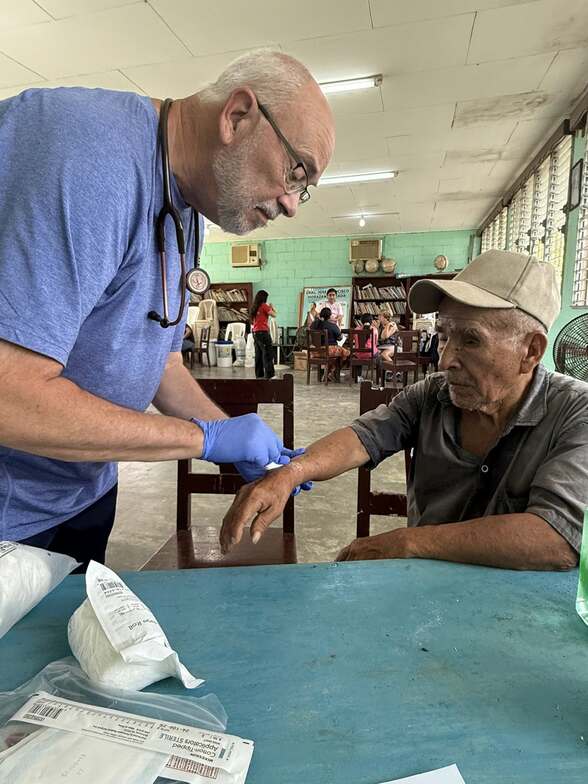
Twenty Years In - Honduras Reflections from Jon Dailey
Sandals crunched in the sand. Step by step, yard by yard, mile by mile. Thomas wasn’t sure about this—this business of Jesus sending all twelve of them out all over the countryside. Gonna cast demons and cure people—never done that—don’t have those skills. And, making matters worse, getting sent out with no food, no money, no change of clothes, and no backpack. Doubt comes knocking yet again.
Sandals crunched in the sand. Step by step. Walking from the church bus parked on the roadside to the little clinic building in Paujiles, Honduras. This year seventeen of us have been sent. We are called on to heal the sick, but not all of us are trained in that line of work and we
wonder if we have the right skills and supplies for what we will face. We have done the medical
mission many times before, but doubt comes knocking yet again.
The Bible is replete with episodes of God sending and people being sent. Chapter 9 of Luke
has the sending out of the twelve (likely the first Christian medical mission) and, on the heels of
this success, chapter 10 follows with the sending out of the seventy-two. One success was followed by another and that is essentially the story of the St. John’s Montgomery medical mission to Honduras—one on another until here we are over twenty years in.
In Luke 10 lies a very telling verse: Jesus said to them, “The harvest is plentiful, but the laborers are few.” How does that apply to church mission? The harvest is unarguably plenty in terms of Hondurans needing medical care, but could equally be other options: local school partners, Habitat for Humanity, Sawyerville, Special Session, and other options in the Diocese of Alabama. Indeed a plentiful harvest awaits.
So where are the laborers? Stating the obvious, that’s us. But what keeps us from going to the
fields? In the Episcopal church we are quick to talk about our “three-legged stool” of scripture,
reason, and tradition. However, there is another three-legged stool that keeps folk out of the
mission experience: fear, worry, and anxiety. It has been said that fear is a basic emotion, worry
is the thought process going with that, and anxiety is the body’s response. Over the years, we
have heard it all. “I would like to go on a mission trip, but...” But what? Afraid of foreign travel.
Potential crime. Don’t speak the language. I don’t have the skills. What will I eat? What if I get
sick? Each type of mission will have a similar set of responses (excuses). The bottom line is that people are skittish about going out of their comfort zone.
Jesus did not fall prey to the insecurities of the disciples. Rather, he confronted the anxiety head on by sending them out. Immersion therapy you could call it. “I am sending you out as lambs in the midst of wolves.” “Go out and do it—I have got you covered,” he said. What was the result? The seventy-two “returned with joy,” telling Jesus that demons had submitted to them. Who can say what were those demons of yore, but we now face the modern demons of disease and poverty. Our team members likewise return with joy in having helped those less fortunate, feeling equally blessed by those they have gone to serve. One might think that a short-term mission is not that effective, but if you are that Honduran who is free of parasites for 3 months, or has relief from arthritis, or the simplicity of a new pair of reading glasses, then that relief is significant. Twenty years in we have treated over 30,000 patients and dispensed over 100,000 medication prescriptions. Yet the true prescription is intangible: it is the prescription of hope.
Among all these patients we have had standout cases. Marco, an unfortunate paralytic in a wheelchair whose wounds were treated as was Chris, a young teen with spina bifida. Julia, a
lupus victim found to be in adrenal crisis. Francisco, a diabetic stroke victim returned to normal ambulation and blood sugars. Then Dona Maria, matriarch of the local Episcopal church, health greatly deteriorated at age 96, but for whom we call on yearly at her house (a shack in the swamp actually) to repay her dedication to God and man. Are short term missions effective? No argument when a life is saved.
Our team members have experienced joy in looking at those numbers and also in the individual
challenging patients. The non-medical folk have been amazed in realizing that they do in fact
have new-found skills to help others. We have seen many “aha” moments over time. The Social Gospel of Christianity would say that one cannot truly function as a Christian outside of community—it is not just the individual. It is about relationships with team members from both
US and our sister parish of Espiritu Santu that have stood the test of time and distance.
Let’s cut to the chase. Are you at a point spiritually to consider participating in mission? No,
not just an overseas medical mission. Something is there for you. Open your mind. Think. Analyze. Meditate. Pray. As a challenge, recall the lyrics of a tune from the old blues man Mississippi John Hurt:
Here am I, O Lord send me.
Hark the voice of Jesus calling.
Who will go and work today?
Oh the fields are ripe, and the harvests waiting
Who will go bear those sheaves away?
Who? You?